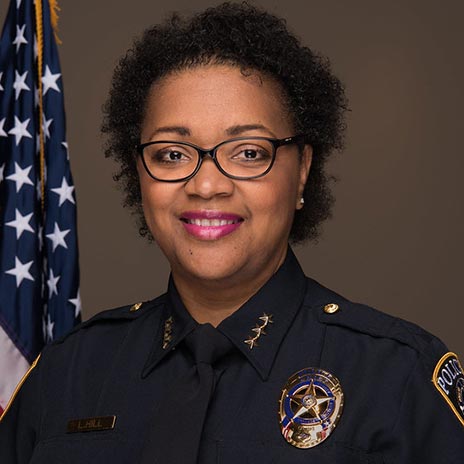
Dallas College Police Chief Lauretta Hill
What can be learned from the current crisis following the death of George Floyd?
Contact: Debra Dennis;
ddennis@dcccd.edu
For immediate release — July 29, 2020
(DALLAS) — Dallas College Police Chief Lauretta Hill has introduced changes that she says will make Dallas College police officers more transparent, responsible and responsive while interacting with the public. In this era of renewed police accountability, Hill is re-emphasizing rules and regulations, particularly use-of-force, bias-influenced interactions and lack of accountability.
Not all police entities have banned chokeholds as Hill implemented nearly four years ago. But Dallas College expressly prohibits officers from using neck restraints, including controversial chokeholds.
“I banned chokeholds when I got here,” said Hill. Chokeholds, she said, are both excessive and unnecessary. “We have to make officers aware of their roles and make sure we are meeting the needs of the community we are serving. Regarding what happened to George Floyd, I’m more reflective on what more I can do.”
Body cameras are part of the uniforms of each Dallas College officer, she said. And all police vehicles are equipped with cameras. Hill has also streamlined the complaint process so that anyone who wants to file a report can do so.
The Elephant in the Room
Hill unveiled policy changes during a meeting last month with Dallas College administrators following the gruesome killing of George Floyd by Minneapolis police. Floyd’s death prompted colleges across the nation to review their interactions with citizens, policies set by the department and state laws regarding use of force.
At Dallas College, police practices are routinely monitored to determine compliance and if additional training is needed, Hill said. For example, bias training helps officers to unlearn their unconscious prejudices.
“Everyone has implicit biases, so what you can learn to do is to overcome that bias,” Hill said. “Officers are people, but we can overcome those biases if we try to understand people who are not like us.”
Dr. Joe May, Dallas College chancellor, said he applauds efforts aimed at culturally sensitive de-escalation, a major part of the social justice initiatives Dallas College is reviewing.
“Our police department is an integral part of the campus community,” Dr. May said. “The fine men and women who comprise our law enforcement operation play a vital role in protecting us, too. Under Chief Hill’s leadership on the issue of equity and responsible use of force, the department is a model for the community.”
In addition to reviewing police training, Hill wants her officers to be viewed as a resource to help students, faculty and staff safely navigate Dallas College’s campuses.
“That’s our goal in campus policing — to have a welcoming, accessible and safe environment. This moment has caused all of law enforcement to take a pause. We must be transparent in how we make decisions,” Hill said.
As part of that, Hill has also implemented a “duty to intervene” policy that orders officers to step in when they witness another officer demonstrate questionable or illegal behavior.
“Committing any violation or using a level of force that is not reasonable, if you see this you must stop it and you must report it to a supervisor,” she said. “Accountability starts with me and goes all the way down to the last person hired here.”
The push for accountability is supported by the International Association of Chiefs of Police (IACP), an organization that hopes to build trust between police and the communities they serve.
“Any officer who violates their oath of office has no place in our agencies,” IACP President Steven Casstevens said in a statement. “They betray their fellow officers and tarnish the reputation of a profession that is dedicated to protecting the public and preserving the sanctity of life.”
“Poor policing is a bad reflection on all officers. Officers have expressed some concern that there are so many negative connotations about them and that they don’t want to be lumped in and painted with a broad brush,” Hill said. “But you don’t have to worry about anything if you’re doing the right thing, and I think we’re doing the right thing for our college community.”
# # #